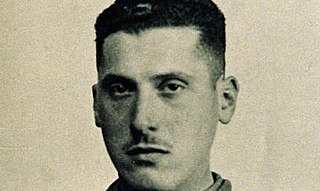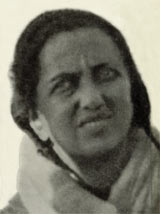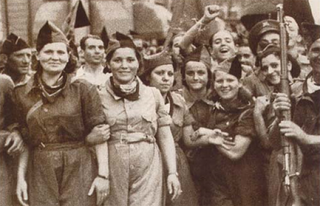Related Research Articles

The International Brigades were military units set up by the Communist International to assist the Popular Front government of the Second Spanish Republic during the Spanish Civil War. The organization existed for two years, from 1936 until 1938. It is estimated that during the entire war, between 40,000 and 59,000 members served in the International Brigades, including 15,000 who died in combat. Beyond the Spanish Civil War, International Brigades is also sometimes used interchangeably with the term foreign legion in reference to military units comprising foreigners who volunteer to fight in the military of another state, often in times of war.

The Lincoln Battalion was the 17th battalion of the XV International Brigade, a mixed brigade of the International Brigades also known as the Abraham Lincoln Brigade. It was organized by the Communist International and named after President Abraham Lincoln who led the US in its fight to end slavery during the American Civil War.

The Mackenzie–Papineau Battalion or Mac-Paps were a battalion of Canadians who fought as part of the XV International Brigade on the Republican side in the Spanish Civil War in the late 1930s. Except for France, no other country had a greater proportion of its population volunteer in Spain as did Canada. The XV International Brigade, made up also of volunteer battalions from the United States and Britain, was involved in the Battle of Jarama, in which nine Canadians are known to have been killed.
Samuel George Montague Nathan was a British volunteer in the International Brigades in Spain. He initially commanded the British Company of the otherwise French Marseillaise Battalion but was appointed battalion commander in early 1937 following the execution of his predecessor for espionage.

The Connolly Column was the name given to a group of Irish republican socialist volunteers who fought for the Second Spanish Republic in the International Brigades during the Spanish Civil War. They were named after James Connolly, the executed leader of the Irish Citizen Army. They were a company-strength unit of the XV International Brigade, which also included the US, British and Latin American battalions in Spain. The name is now retroactively applied to all Irish volunteers who fought for the Spanish Republic.
The British Battalion was the 16th battalion of the XV International Brigade, one of the mixed brigades of the International Brigades, during the Spanish Civil War. It comprised British, Irish, and Dominion volunteers.

Felicia Mary Browne was an English artist and leftist. She was the first British volunteer to die in the Spanish Civil War. Her body was not recovered.

Sam Lesser was a British journalist and veteran of the Spanish Civil War's International Brigades. Lesser was one of the last surviving British veterans of the Spanish Civil War, and went on to serve as chair of the International Brigade Memorial Trust (IBMT), and write for the Daily Worker and its successor, the Morning Star.
Scottish Volunteers in the Spanish Civil War comprised 23% of the estimated 2,400 men and women who travelled from Great Britain to serve in the International Brigades in the Spanish Civil War. Along with the 549 military volunteers, extensive funds and support for Republican Spain were raised through a nationwide grass-roots Aid for Spain movement; per capita, Scotland's contributions were among the most substantial foreign aid offered to the Republic over the period of 1936–1939.

Salaria Kea O'Reilly was an American nurse and desegregation activist who volunteered in both the Spanish Civil War and the Second World War. During the Spanish Civil War she was the only African American nurse working in the Abraham Lincoln Battalion.

The American Medical Bureau (AMB), also known as the American Medical Bureau to Save Spanish Democracy, was a humanitarian aid institution associated to the Lincoln Battalion, providing a medical corps, nursing systems for casualties, as well as accommodation and treatment to those who were wounded on the Spanish Republican side of the battlefield in the Spanish Civil War (1936–1939).

Mika Feldman de Etchebéhère was an Argentine militant anarchist and Marxist. She served as captain of the POUM militia during the Spanish Civil War in 1936, and was also active in the anarcha-feminist organization, Mujeres Libres.

Thora Silverthorne (1910–1999), also known as "Red Silverthorne", was a British Communist, healthcare activist, and a nanny for Somerville Hastings, former president of the Socialist Medical Association (SMA), and Labour Party MP for Reading, Berkshire. She is most known for her service to the International Brigades during the Spanish Civil War, and for her roles in helping to found both Britain's National Health Service (NHS), and co-founding Britain's first union for rank and file nurses.
Annie Cargill Knight was a Scottish nurse in the Spanish Civil War (1936-1939). Knight was the daughter of a tenant farmer and one of eight children. She became active in the Communist Party after she finished her training as a nurse. She was one of the first British volunteers to arrive in Spain on the side of the Spanish Republican Government during the Spanish Civil War.

Milicianas fought in the Spanish Civil War. They came from a culture with iconic fighters, and where women had been recently empowered through direct political engagement in political organizations and labor unions. The Dictatorship of Primo de Rivera saw women take more to the streets to protest and riot, though their actions were dismissed by male political leaders. The creation of the Second Spanish Republic led to an environment encouraging active political participation in broader Spanish society, and ultimately served to assist many women in their decision to head to the front, as the Government expanded rights for women, including the right to vote, divorce, go to school and stand for election.
Women in the Communist Party of Spain (PCE) in the Spanish Civil War were highly active, the most visible figure in the movement being Dolores Ibárruri, who joined in its early years. The Dictatorship of Primo de Rivera pushed the group underground, where they had to meet clandestinely around their public face, the football club Oriente FC.
Women in the Spanish Civil War saw the conflict start on 17 July 1936. The war would impact women's everyday lives. Feminist solutions to problems of women in this period often took an individualistic approach. For women of the Second Republic, by close of the Civil War their efforts for liberation would fail.
Patience Darton was a British nurse and political activist active during the Spanish Civil War.

Alexander Wheeler Wainman (1913-1989) was a British photographer, Quaker, and Slavonic Scholar at the University of British Columbia. He is most known for his work as a frontline medical volunteer for the Republican government and anti-fascist forces during the Spanish Civil War, and for the large collection of photographs he took during the war, which was published posthumously.

The Oxford Spanish Civil War memorial is a monument in Oxford dedicated to local residents who fought in the Spanish Civil War (1936-1939) against Nationalist forces. Erected and unveiled in 2017, the memorial is located close to South Park, near the base of Headington Hill by the junction of Headington Road and Morrell Avenue. The memorial is dedicated to all the volunteers with links to Oxfordshire who supported the Republicans and inscribed onto the front are the names of the six volunteers in the International Brigades who were killed during the war.
References
- ↑ Preston, Paul (2003). Doves of war: four women of Spain (Pbk. ed.). London: HarperCollins. pp. 119–201. ISBN 0006386946. OCLC 51527556.
- ↑ Baxell, Richard (2012). Unlikely warriors : the British in the Spanish Civil War and the struggle against fascism. London: Aurum. pp. 321. ISBN 9781845136970. OCLC 793214059.
- ↑ Green, Nan (2004). A Chronicle of Small Beer. Nottingham: Trent Editions.